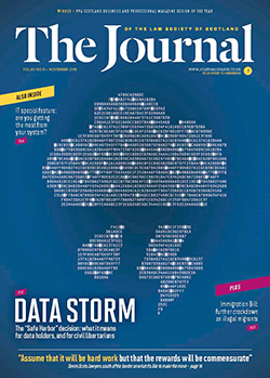Heading for a showdown on hard won human rights?
The UK Government has given indications that it intends to bring forth its proposals for a “British Bill of Rights” within weeks, in pursuit of its commitment set out in the Queen’s Speech to replace the Human Rights Act 1998. It has been reported that this process will start with a
This commitment is underpinned by the UK Government’s stated aims of reforming and modernising the current framework for human rights protection, claiming it will restore “common sense” to the application of human rights laws. However, there is also scepticism about its reassurances that the proposed Bill will give existing rights sufficient protection, with a suspicion that it may well result in an erosion of the rights currently protected by the Human Rights Act.
The Scottish Government has stated that it will resist any repeal of the Human Rights Act and indicated its view that any attempt to amend it would require a legislative consent motion to be passed by the Scottish Parliament in accordance with convention. It is understood that the Scottish National Party will also oppose any weakening of human rights protections across the UK.
Holyrood inquiry
At the Scottish Parliament, the European & External Relations Committee recently announced that it will hold an inquiry into the potential implications for Scotland of the proposed replacement of the Human Rights Act. A call for written evidence has been issued by the committee, with submissions requested by 18 November 2015. The inquiry will inform further work that is to be done by the Scottish Parliament once the UK Government’s more specific proposals have been made available.
The committee is currently seeking views on the UK Government’s general proposals and whether people think that any changes need to be made at all to the current human rights regime. The committee has also asked for views on what rights a Bill of Rights should contain and how it would interact with Scotland’s separate legal system.
Views are also being sought by the committee on arguments made at UK Government level that the Human Rights Act does not give sufficient respect to the UK Parliament’s sovereignty and that the European Court of Human Rights has engaged in “mission creep”, expanding the reach of ECHR into areas that it should not cover. The committee has also asked for comments on what people see as being the practical implications of the proposals in specific areas, for
The committee seeks responses to the question of whether the UK Government could act to make the proposed changes without the consent of the Scottish Parliament. Whilst UK legislation without
Further strengthening?
Supporters of the Human Rights Act are generally advocating retention of the Act with a call for no change, although some consider that improvements could be made to the Act, for example by incorporating article 13 (right to an effective remedy) into the definition of Convention rights, or by providing clarification in the Act to ensure that it applies to a range of private bodies exercising public functions, as well as public bodies. The Scottish Government could further underline its own support for human rights protection by giving an additional power to the Scottish Human Rights Commission to provide support to people pursuing cases alleging a breach of their human rights, a power that many other such bodies already have and use effectively.
Further information on the European & External Relations Committee’s human rights inquiry can be found at: www.scottish.parliament.uk/parliamentarybusiness/CurrentCommittees/92540.aspx
In this issue
- Appropriate adults and defence agents: who does what?
- Buying from a housing association: why consent matters
- Harassment: a civil claim?
- A welcome abroad: EYBA in London
- Reading for pleasure
- Opinion: David Faith
- Book reviews
- Profile
- President's column
- ScotLIS gets the green light
- People on the move
- Storm over Safe Harbor
- Light on a murky world
- Southern horizons
- Mediation minefield
- Migrants: no way to turn?
- The technological edge
- As our suppliers see us
- More rules to grapple with
- Fraud and divorce – a Scottish Sharland?
- What future for employment tribunal fees?
- Heading for a showdown on hard won human rights?
- Taxing question of relief
- Scottish Solicitors Discipline Tribunal
- How far can we rely on the register?
- All part of the game
- Law reform roundup
- From the Brussels office
- Poverty: a new front in the war
- Damage limitation: working it out
- Ask Ash
- A lawyer's lament
- Appreciation: Michael Scanlan






